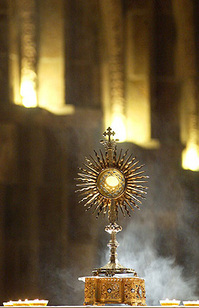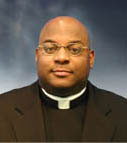In early September I drew our attention to the work of an English bishop trying to renew the exercise of faith and reason in his diocese. Dominic Baster's October 29th interview with Bishop Patrick O'Donoghue of Lancaster was published on Zenit.org and it would be good to read it.
In this interview with ZENIT, Bishop O'Donoghue explains what led him to write the document, why he thinks Vatican II has been misinterpreted, and how authentic Catholic renewal can be achieved.
Q: Why did you feel it was necessary to produce such a comprehensive critique on the Church in
Bishop O'Donoghue: Similar to the rest of the Catholic Church, the Diocese of Lancaster has had successes in its implementation of the decisions of the Second Vatican Council, but also a variety of problems. These I frankly lay out in my document so we can at last talk about them openly and honestly.
For too long, bishops and people have been inhibited about openly admitting the sickness in the Church, and wider society, caused by misinterpretations of the Council, and the corresponding widespread dissent. If we fail in our duty of presenting the truths of the faith, it is not only the Church that suffers, but also wider society.
However, I can see signs that this reticence to speak out about the misinterpretation of the Council is changing under the leadership of Pope Benedict XVI, with more bishops -- particularly in the United States -- going public about the need to heal the wounds in the Church.
Q: Why do you think Vatican II has been misinterpreted by so many?
Bishop O'Donoghue: What we have witnessed in Western societies since the end of the Second World War is the development of mass education on a scale unprecedented in human history -- resulting in economic growth, scientific and technological advances, and the cultural and social enrichment of billions of people's lives.
However, every human endeavor has a dark side, due to original sin and concupiscence. In the case of education, we can see its distortion through the widespread dissemination of radical skepticism, positivism, utilitarianism and relativism. Taken together, these intellectual trends have resulted in a fragmented society that marginalizes God, with many people mistakenly thinking they can live happy and productive lives without him.
One of the great truths recognized by the Second Vatican Council is that the Church is part of human history and culture. Therefore, it shouldn't surprise us that the shadows cast by the distortion of education, and corresponding societal changes, have also touched members of the Church. As Pope Benedict XVI puts it, even in the Church we find hedonism, selfishness and egocentric behavior.
The Second Vatican Council tends to be misinterpreted most by Catholics who have had a university education -- that is, by those most exposed to the intellectual and moral spirit of the age. These well-educated Catholics have gone on to occupy influential positions in education, the media, politics, and even the Church, where they have been able to spread their so-called loyal dissent, causing confusion and discord in the whole church.
This failure of leadership has exacerbated the even greater problem of the mass departure from the Church of the working-class and poor. For example, the relentless diatribe in the popular media against Christianity has undermined the confidence of the ordinary faithful in the Church.
I strongly support Catholics receiving a university education, but we have to ensure that they also have a firm grounding in the fullness of the faith from an early age in our homes, schools and parishes, and that they are equipped to challenge the erroneous thinking of their contemporaries.
Q: One of the questions you address is whether we have forgotten what it is to be Catholic. What do you say to those whose response to this crisis in Catholic identity is to reject change altogether?
Bishop O'Donoghue: The Jewish Christians in the early Church didn't want to embrace the dietary and ritual changes that were implicit in Jesus' Gospel. If they had succeeded in their opposition to Sts. Peter and Paul, the Church would not have spread like wildfire throughout the Roman world, and beyond.
The strength and vitality of Catholicism -- which is a sign of the abiding presence of the Holy Spirit -- is that it can change and adapt to its surrounding culture, while at the same time maintaining what is essential and definitive about its identity, that originates from the will of God. As Cardinal Henri de Lubac passionately believed, the Catholic genius is to balance necessary change with eternal continuity.
Q: You describe the liturgy as "the wellspring of the life of the Church" and "the authentic starting point of all renewal." How should we balance continuity and change in the liturgy in ordinary Catholic parishes?
Bishop O'Donoghue: "Sacrosanctum Concilium" [The Constitution on the Sacred Liturgy] remains a sound, measured guide to how we cultivate an authentic liturgical life in our parishes. Paragraph 23 deals with the challenge of balancing the retention of "sound tradition" with openness to "legitimate progress."
Applying this principle to the Mass, the Council fathers directed that the use of Latin must be preserved in the Latin-rite Church, balanced with the use of the vernacular.
In the light of this, I have recommended to my parishes that Latin should play a regular part in the celebration of the Mass, such as the Gloria, the Credo, Sanctus, Pater Noster, and Agnus Dei. If only this sense of balance had been observed over the past 40 years, we would have avoided the banality, trivialization and secularization of the liturgy that has been all too common in the modern Church.
I think it true to say that in our almost frantic search to create meaningful liturgy that speaks to modern men and women, we fell into the trap on occasions of superficiality and novelty. What we need to do now is to understand more deeply man's search for meaning, which will include the need for the sacred, and the apprehension of the transcendent.
Q: While urging Catholics to remain committed to the work of ecumenism, you acknowledge that it sometimes leads to an "urge to gloss over significant differences" between Christians. What should be the practical goal of authentic ecumenism?
Bishop O'Donoghue: It's time we admitted that a wrong type of ecumenism has put a brake on the Catholic Church's freedom to engage in evangelization and mission in society. It's as if our fear of offending other Christians has inhibited us from confidently proclaiming the distinctive and defining truths of Catholicism.
However, the Council father's insight that Christian communities outside the Catholic Church contain elements of sanctification and truth -- see "Lumen Gentium," No. 15, and "Unitatis Redintegratio," No. 3 -- provides us with the agenda for authentic ecumenism.
Those elements of the Catholic Church that we have in common with non-Catholic churches and ecclesial communities should be the focus of our dialogue, to the mutual enrichment and deeper understanding of both parties. In this way we will be able to explain the full Catholic understanding of doctrine, highlight any distortions that have occurred, and come to a deeper appreciation of the truth ourselves.
Our goal should always be to strengthen the imperfect communion that already exists in the hope that non-Catholics will come to see and come to seek the fullness of truth.



